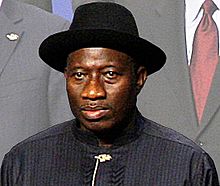2011 presidential election in Nigeria
The 2011 presidential elections in Nigeria took place on April 16, 2011 after being postponed twice. At the national level, the president and the vice-president were elected. The INEC (Independent National Electoral Commission), the independent Nigerian electoral authority, has not quite 70 million of the 150 million inhabitants included in the electoral roll as eligible voters . According to official figures, 19 politicians are running for the office of president, who rules for a term of four years. Three of the candidates, Goodluck Jonathan , Muhammadu Buhari and Nuhu Ribadu made the race among themselves. Goodluck Jonathan clearly prevailed with almost 60% of the vote, followed by Buhari, who won almost a third of the vote, and Ribadu, who was only able to prevail in one state and only received 5% of the nationwide, was far behind.
The 2011 parliamentary elections (the elections for the "House of Representatives") had already taken place on April 9 , in which the ruling Peoples Democratic Party , of which Goodluck Jonathan is a member, won a clear majority despite losses. On April 26th the elections for the governors and the parliaments of the individual states are to take place in the states.
Starting position
Umaru Yar'Adua , the previous Nigerian president elected in the 2007 presidential elections in Nigeria, died on May 5, 2010 in Abuja . His runner-up, Goodluck Jonathan , runner-up from the same camp originally represented the Christian Niger Delta , while Umaru Yar'Adua represented the Muslim north. Goodluck Jonathan assumed the presidency on May 6, 2010. A non-constitutional agreement called “zoning” here restricts rule in Nigeria ethno-religiously . The “ Islamic North” has agreed with the “ Christian South” to let the most important offices such as those of President and Vice-President rotate geographically. Over 50% of Nigerians are Muslims, between 40 and 48% are Christians, while the rest of the population profess a traditional African religion . The "zoning" also takes into account the west and east of the country.
Presidential candidates
The parties' presidential candidates were announced in December 2010. The People's Democratic Party (PDP), the strongest party since the last election, voted Goodluck Jonathan, the incumbent, as its candidate. His vice-candidate (the so-called running mate , who runs for the office of vice-president) is Namadi Sambo , who is still vice-president today. Until May 18, 2010, he was the governor of the state of Kaduna in the north-central part of the country. In the last polls before the election, Goodluck Jonathan had more than 60 percent of the vote.
According to press reports, the candidacy of Nuhu Ribadu from the opposition Action Congress (AC) party was also given great opportunities.
Muhammadu Buhari , who was president from 1983 to 1985 after a military coup , ran for the newly founded Congress for Progressive Change (CPC) .
Results
Procedure and aftermath of the elections
After the bloody events in the 2007 presidential election with hundreds of deaths, the 2011 elections were largely peaceful. However, the feared unrest followed after the results were announced. In the days after the elections, there were riots with around 120 dead in the cities of northern Nigeria, the vast majority of whom voted for Buhari and not for the election winner Jonathan from the south. The Nigerian Red Cross also spoke of around 35,000 people who fled the unrest in Nigeria's capital Abuja .
Web links
- Klaus Pähler: Nigeria votes - more good luck for Jonathan? (PDF) Konrad Adenauer Foundation , April 2011
Individual evidence
- ↑ Nigeria postpones parliamentary and presidential elections again ( page no longer available , search in web archives ) Info: The link was automatically marked as defective. Please check the link according to the instructions and then remove this notice.
- ↑ a b Nigerians elect their president . In: Handelsblatt , April 16, 2011
- ↑ af.reuters.com
- ↑ Bartholomäus Grill: An Obama for Africa . In: Die Zeit , No. 15/2011
- ↑ Northern Nigeria: headscarf compulsory - also for Christian schoolgirls
- ↑ Nigeria @ 50 - Of parades and car bombs: Reflection on an anniversary . ( Page no longer available , search in web archives ) Info: The link was automatically marked as defective. Please check the link according to the instructions and then remove this notice. University of Mainz
- ↑ BBC : Nigerian President Goodluck Jonathan to seek one term
- ↑ naijan.com
- ↑ naijan.com
- ↑ naijan.com
- ↑ naijan.com
- ↑ naijan.com
- ↑ naijan.com
- ↑ naijan.com
- ↑ naijan.com
- ↑ naijan.com
- ↑ naijan.com
- ↑ naijan.com
- ↑ naijan.com
- ↑ naijan.com
- ↑ naijan.com
- ↑ naijan.com
- ↑ naijan.com
- ↑ Taiwo Adisa: Abuja Bomb Blasts: Odds Against IBB . In: The Tribune , October 9, 2010. Archived from the original on November 14, 2010 Info: The archive link was automatically inserted and has not yet been checked. Please check the original and archive link according to the instructions and then remove this notice. . Retrieved April 17, 2011.
- ↑ Peaceful choice, unpeaceful contestation . In: taz , 21./22. April 2011

